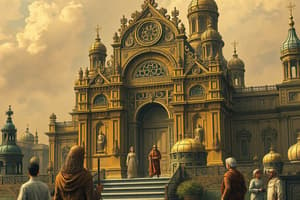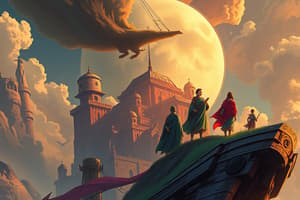Podcast
Questions and Answers
What is a characteristic of urbanization in a civilization?
What is a characteristic of urbanization in a civilization?
- Reduced trade and commerce
- Increased social equality and shared power
- Decentralized population and economic decline
- Concentrated population and economic growth (correct)
Which type of civilization is characterized by a focus on individual cities or city-states?
Which type of civilization is characterized by a focus on individual cities or city-states?
- River valley civilizations
- Agricultural civilizations
- Empires
- City-state civilizations (correct)
What is a result of specialization of labor in a civilization?
What is a result of specialization of labor in a civilization?
- Increased efficiency and productivity (correct)
- Reduced social mobility and unequal distribution of power
- Limited cultural achievements and innovations
- Decreased efficiency and productivity
Which of the following is an example of a river valley civilization?
Which of the following is an example of a river valley civilization?
What is a negative impact of civilization on the environment?
What is a negative impact of civilization on the environment?
What is a cultural achievement of civilization?
What is a cultural achievement of civilization?
Flashcards are hidden until you start studying
Study Notes
Definition of Civilization
- A complex human society characterized by:
- Urbanization
- Social hierarchy
- Specialization of labor
- Development of writing
- Organized government
- Art, architecture, and cultural achievements
Characteristics of Civilization
- Urbanization: Development of cities, leading to concentrated population and economic growth
- Social hierarchy: Stratification of society into classes, with division of labor and unequal distribution of power and wealth
- Specialization of labor: Differentiation of tasks and occupations, leading to increased efficiency and productivity
- Writing: Development of written language, enabling record-keeping, communication, and knowledge preservation
- Organized government: Establishment of formal institutions, laws, and systems of governance
Types of Civilizations
- River valley civilizations: Developed near rivers, often in fertile valleys, with early examples including:
- Mesopotamia (Tigris and Euphrates rivers)
- Ancient Egypt (Nile River)
- Indus Valley Civilization (Indus River)
- City-state civilizations: Focused on individual cities or city-states, such as:
- Ancient Greece (e.g., Athens, Sparta)
- Medieval Italian city-states (e.g., Florence, Venice)
- Empires: Large, multi-ethnic states with centralized power, examples include:
- Ancient Rome
- Mongol Empire
- British Empire
Impact of Civilization
- Cultural achievements: Development of art, architecture, literature, and philosophy
- Scientific and technological advancements: Innovations in fields like agriculture, metallurgy, and engineering
- Social and economic progress: Increased trade, commerce, and social mobility
- Environmental impact: Deforestation, pollution, and habitat destruction due to urbanization and resource exploitation
Definition of Civilization
- A complex human society characterized by urbanization, social hierarchy, specialization of labor, development of writing, organized government, and art, architecture, and cultural achievements.
Characteristics of Civilization
Urbanization
- Development of cities, leading to concentrated population and economic growth.
Social Hierarchy
- Stratification of society into classes, with division of labor and unequal distribution of power and wealth.
Specialization of Labor
- Differentiation of tasks and occupations, leading to increased efficiency and productivity.
Writing
- Development of written language, enabling record-keeping, communication, and knowledge preservation.
Organized Government
- Establishment of formal institutions, laws, and systems of governance.
Types of Civilizations
River Valley Civilizations
- Developed near rivers, often in fertile valleys, with early examples including Mesopotamia (Tigris and Euphrates rivers), Ancient Egypt (Nile River), and Indus Valley Civilization (Indus River).
City-State Civilizations
- Focused on individual cities or city-states, such as Ancient Greece (e.g., Athens, Sparta) and Medieval Italian city-states (e.g., Florence, Venice).
Empires
- Large, multi-ethnic states with centralized power, examples include Ancient Rome, Mongol Empire, and British Empire.
Impact of Civilization
Cultural Achievements
- Development of art, architecture, literature, and philosophy.
Scientific and Technological Advancements
- Innovations in fields like agriculture, metallurgy, and engineering.
Social and Economic Progress
- Increased trade, commerce, and social mobility.
Environmental Impact
- Deforestation, pollution, and habitat destruction due to urbanization and resource exploitation.
Studying That Suits You
Use AI to generate personalized quizzes and flashcards to suit your learning preferences.




